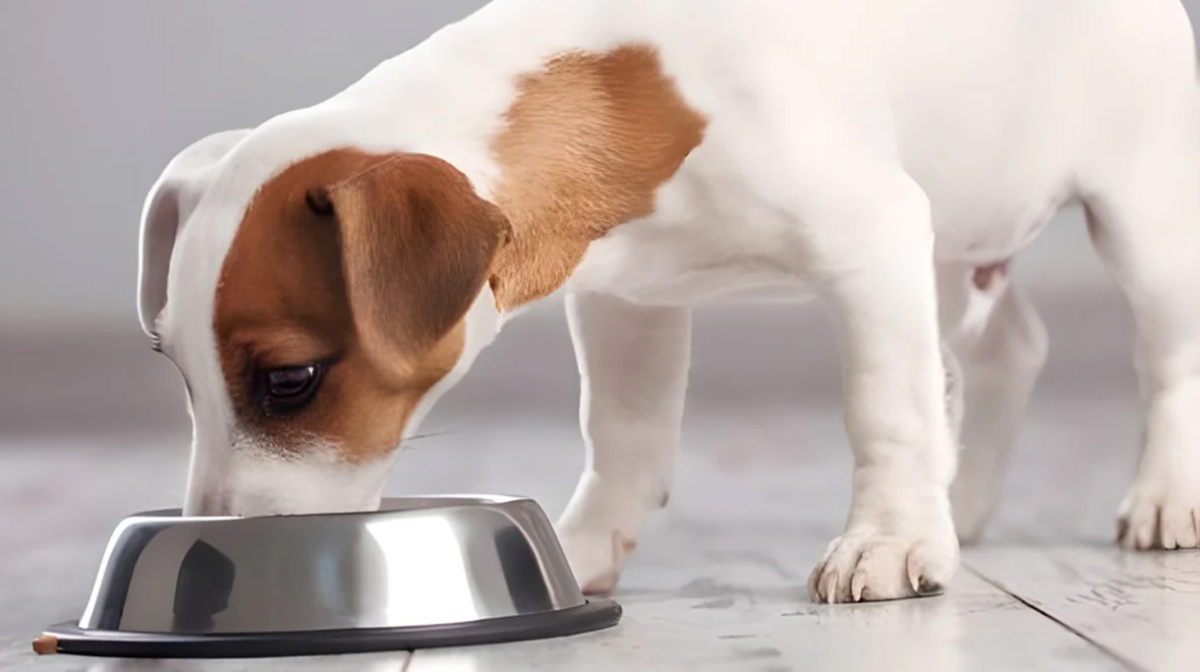
Bringing a new puppy into your home is an incredibly exciting time, but it is not a simple task, especially if you are a first-time owner! There is a lot to learn before bringing your new puppy home so you are suitably prepared to ensure they are healthy and happy. Preparing for your new puppy’s arrival will help them settle down into their new home quickly and comfortably.
Naturally, one of the first puppy care topics new owners want to research is feeding puppies, from what to feed puppies to the frequency of meals. After all, you can’t trust your hungry, rapidly growing puppy to tell you; they are likely to eat whatever is put under their nose!
Our feeding guide for puppies tackles the most common and pressing questions new puppy owners ask to ensure that they are achieving a complete and well-balanced diet. Many factors will influence your puppy’s nutrition including their age, size, breed and activity levels. Our feeding guide for puppies will cover everything you need to know.
Feeding Guide for Puppies: What Do Puppies Eat?
Owners often worry about what to feed puppies to ensure their nutritional needs are met. High-quality puppy food should be formulated to be complete and balanced; this will be reflected on the label and means that the food meets all the nutritional needs of your dog or puppy. Puppies need more calories, proteins, vitamins and minerals in the correct amounts and ratios, depending on their breed and size. Their needs also change and adapt as they grow, which is why choosing a high quality, complete and balanced puppy food is so important.
So, what do puppies eat? The most popular types of dog food puppies eat are dry (kibble), wet food and home-prepared meals.
Feeding puppies dry food (kibble) is convenient; it can be left out in the food bowl for grazing and is easily stored. Kibble is considered to be economical and tasty.
Wet food has a higher moisture content alongside rich ingredients, smells better for puppies, helps them feel fuller for longer in between meals and can be easier for their little teeth to chew.
Puppies can also eat homemade food as long as it provides a complete and balanced diet. This means that you need the right mix of protein, fat, vegetables, carbohydrates, fat, minerals and vitamins! Preparing the right homemade puppy food safely and consistently for your pet can be difficult, so we advise that you consult with your vet first. It is safer for your pet to be fed a complete and balanced puppy food, produced safely and within nutritional guidelines for the age and size of the puppy.
What Should I Feed My Puppy?
What do puppies eat? You should always feed your puppy food that has been formulated for puppies to ensure it meets all their unique dietary needs and rapid growth. Adult dog food is not nutritionally balanced for puppies; one meal won’t harm them, but feeding puppies food that has been formulated for adult dogs can cause health issues in the long term. There are three main types of puppy diets to consider.
Raw Diet Feeding Guide for Puppies
Puppies can eat a raw diet after weaning (around 4 weeks). However, we do not advise a completely raw diet, as it poses a higher risk of bacterial infection. Raw meat can spread harmful bacteria such as salmonella and it can also contain parasites. Bones could also cause injury to puppies. While some fruits and vegetables are unsafe for dogs to eat, many can be consumed safely and make great substitutes for traditional treats. You can let your puppy snack on items like raw green beans, cantaloupe, blueberries and strawberries. However, be advised that while some fruit and veg are healthy treat alternatives, they can be quite hard on young teeth and could even be choking hazards for puppies, and they are not particularly palatable to puppies. A raw diet can also cause digestive upset and should be given with caution. You'll want to avoid digestive upset - it certainly won’t help with toilet training!
Commercial Food
Feeding puppies commercial wet and dry food is the most popular diet. Buying a complete and balanced food formulated for your pet’s life stage is the best way to ensure they get all the nutrients they need. It is also easier to prepare, store and portion.
Home Cooked Meals
Puppies can eat homemade meals as long as they provide a complete and balanced diet. You will need the right mix of protein, vegetables, carbohydrates, fat, minerals and vitamins! Preparing the right homemade puppy food for your pet and meeting their nutritional requirements consistently every day can be complicated, so we advise that you consult with your vet first so they can help guide you. Home cooked meals may be more difficult to store, costly and take time to prepare. You will also need to do a lot of research in order to make them complete and balanced and cook the meals safely to eliminate any potentially harmful bacteria.
What to Feed Puppies to Ensure Proper Growth
There are several essential nutrients required in a puppy’s diet to support their growth and health including proteins, fats, carbohydrates, vitamins and minerals. This is why choosing wet, dry or a mix of these store bought puppy foods is one of the most reliable ways to ensure your pet is getting everything they need from their diet.
It is also important to be aware of labelling when choosing commercially prepared puppy foods. Looking for AAFCO approval is the easiest way to ensure the food is ‘complete and balanced’ and contains all the essential nutrients for your dog’s life stage. Not all dog food is AAFCO approved!
Does My Puppy need ‘Puppy’ Food?
While puppy food should have many of the same ingredients as adult dog food, puppy food tends to have higher concentrations of essential nutrients. Puppies have a lot of growing and developing to do, and building these tissues requires lots of protein, calcium and numerous other nutrients, as well as a lot of energy, depending on their breed and size. This is why you should always feed your puppy food that has been formulated for puppies to ensure it meets all their unique dietary needs.
How long a puppy needs to eat puppy food will depend on their size and breed; small breeds generally need to eat puppy food for a year, and large breeds may need to eat puppy food for two years.
How Often Should Puppies be Fed: Feeding Schedules Explained
How often should puppies be fed? Puppies should be fed between four and six small meals a day, while adult dogs should have two larger meals per day. This is because puppies still have small stomachs and they cannot eat a lot before they become full. However, this doesn’t stop them from getting overexcited during mealtimes, which often results in them overeating. Overeating can lead to digestive problems, diarrhoea, distended stomachs and bad eating habits that continue into adulthood.
While there is no “best time” to feed your puppy, you should aim to spread their daily recommended food serving out evenly throughout the day to keep their energy up. We would advise feeding 3 to 4 small meals per day. It may help to arrange your puppy’s feeding times to match your own meal and snack times, so it’s easier to remember! Feeding your puppy first thing in the morning will give them energy to start the day ahead. You should avoid feeding your puppy their last meal too close to bedtime, so they have time to digest their food and go to the toilet before going to sleep. Giving your puppy their final meal of the day before 6 pm will prevent toileting accidents during the night.
Furthermore, we recommend purchasing a puppy-sized meal bowl for your new pet. Although weighing out your puppy’s food will ensure that you aren’t overfeeding them, a smaller bowl will also help you serve the right portion every time. If your puppy is eating their food too quickly, you can give them a puzzle feeder to slow them down.
Once your puppy is six months old, depending on their size and breed, they may now be approaching adulthood, which means it is time to start the gradual transition to fewer but larger meals. It's good to plan ahead! Schedule those two meals a day at a time that makes sense to your future timetable, while making sure your dog has a healthy breakfast and afternoon meal. Use your chosen mealtimes to familiarise your puppy with when to expect food. If your puppy knows when you will put their bowl down for them and knows you feed them reliably at the same time every day, they shouldn’t bother you (too much) for food at any other point in the day.
Feeding Your Puppy: A First-Year Timeline
What do puppies eat in their first year and how often should puppies be fed? A puppy's dietary needs change as they grow older. As a general rule, we advise that you feed your puppy 4-6 meals a day from the time that you start to offer them food until weaning (usually two months). From two to three months you should feed your puppy 4 meals a day. When they reach four to six months, you can adjust this schedule to 2-3 meals a day. Finally, when your puppy is over six months of age, you should feed them 2 meals a day, depending on the breed.
Chart Your Puppy’s Weight and Growth
How often should a puppy be fed based on their weight and growth? Firstly, it is important to keep an eye on your puppy's weight so you can make sure they are developing at a healthy rate! A puppy’s ideal weight gain depends on the size and the breed, but on average, you should expect puppies to gain 10–15% of their birth weight each day, or 14g a week for small breeds and 1.1kg a week for larger breeds. Puppies generally double their birth weight between 2-4 months; at 4-6 months of age most puppies have reached at least 50% of their final weight. After 9 months, some breeds may already have reached their full size.
Activity Feeding: Adjusting Portions Based on Activeness
Puppies want to play a lot, so they can learn about the world around them, and new owners should be aware that they may need to adjust what they feed puppies depending on their activity levels.
If you have a particularly boisterous pup, you could risk underfeeding them, and if your pup is a little more chilled out when it comes to playtime, you could also risk overfeeding them! Simply keep an eye on their activity levels and adjust their meals and treats accordingly.
Should I Feed My Puppy People Food or Table Scraps?
We know it is tempting to give human food as ‘treats’ to your dog or puppy when they show a lot of interest in them; however, many human foods can be toxic to dogs and could have disastrous consequences. Key culprits to be aware of include onions, garlic, chives, chocolate, cooked bones, macadamia nuts, corn on the cob, avocados, artificial sweetener (xylitol, found in gum and sweets), alcohol, grapes and raisins! Even small amounts of these items could be fatal; take your dog to the vet as soon as possible! Sticking to a consistent, nutritionally complete diet is key!
Safe snacks like raw green beans, cantaloupe, blueberries and strawberries could work! However, be advised that fruit and veg can be quite hard on young teeth and could even be choking hazards for puppies - they may also cause stomach upset, so treat them with caution!
Help! My Puppy is a Quick Eater
Some new owners may find that their pup eats very quickly and some other puppies might even eat very slowly! Slow eating can increase the potential for risks such as choking and fast eating could cause gastrointestinal issues in puppies. Luckily, there are solutions to these issues in the form of puzzle feeders and slow-feeding bowls, which both work to control the pace of feeding.
How to Switch from Puppy Food to Adult Food
When the day finally comes to make the transition from puppy food to adult food, it is best to make the transition slowly and steadily, as any sudden changes to a puppy’s diet could cause stomach issues! Start by mixing a small amount of adult dog food with their old puppy food and gradually increase the amount of dog food each day while decreasing the puppy food until your pet's diet has made the full transition! This should usually take around two weeks.
Feeding Your Puppy - Frequently Asked Questions
In the next section, we will discuss frequently asked questions about what to feed your puppy, where to feed them and how often puppies should be fed.
Where Should I Feed My Puppy?
You should aim to have a designated feeding area so your puppy can easily settle into their feeding routine. This area should be easily accessible, bright and easy to clean. Puppies prefer a calming, safe space for mealtimes, so choose somewhere which is quiet and less busy than other areas in the home. The kitchen is a natural choice but this may differ in your house!
What to feed an 8 week old puppy?
At 8 weeks, your puppy should be ready to move onto solid foods, including dry food without added liquid. However, wet food may still be a great option for growing teeth and little mouths; it is up to you what you choose to transition to. Puppies generally double their birth weight between 2-4 months, which means they will eat a lot! Typically, 4 meals a day for an 8-10 week-old puppy, depending on size and breed. A puppy bowl can help you measure out portions more easily during this critical developmental stage.
Can 3 week old puppies eat wet food?
Puppies stay with their mum until 10 weeks of age and generally move onto solid food at 4 weeks of age. However, if your puppy is biting or chewing at their milk bottle before the 4-week mark, they may be ready to make the transition sooner. The breeder will need to make this transition slowly and incorporate milk with their semi-solid food, slowly increasing the amount of soft or semi-solid food before they fully move onto solids.
Looking for more tips and tricks to help you look after your new puppy? Join the James Wellbeloved™ Puppy Club today. It's free and jam packed with great advice for first-time owners!









